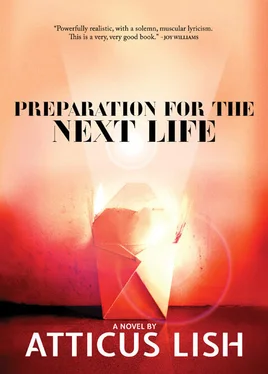WHEN SHE GOT TO work, she found out she wasn’t on the schedule — the high school kid Monroe was there instead of her — and so in the middle of the morning she left the mall and went to 158 thStreet. Before she arrived, she called Skinner but couldn’t reach him.
She knocked on the basement window. Skinner! she whispered. It was about eleven in the morning.
The door was opened by the man she had seen before, who she understood to be the landlord’s son. She had just jogged up a hot street and she was flushed. Her t-shirt, which came from a used-clothing rack on Junction Boulevard, had the words Hand Full across her breasts. The man looked down at her and told her:
He ain’t here.
But she hadn’t said who she was looking for.
The man asked her if she wanted to come in anyway.
She turned around and walked several blocks away, and when she couldn’t get Skinner on the phone, she went back to Main Street, eventually wandering down to the park by Elder Avenue.
On East Broadway, she went to the Fuzhou Fan-Meaning Work Introduction Corp. — the name was a play on the word Benevolent — and waited to speak to someone behind the old-fashioned railway ticket window. Men in white socks and waiters’ pants stood all around talking on their phones, discussing monthly salaries. A man shouted into his cell phone: Two thousand four hundred. But the cook is dishonest! A sign said No Spitting On Floor. You received a free map of Fuzhou down to the sea. A job introduction cost thirty-five dollars. The options were tail cook, main cook, takeout, delivery, cashier, miscellaneous, and wet nurse. You could also get a social security card without a birth certificate. It said this right on the wall in Chinese next to the minimum wage law printed in English.
When it was her turn, the woman who spoke to her through the cutout in the Plexiglas told her she had work available in a number of different states.
I can’t go out-of-state, Zou Lei said. I’ll think about it.
She went outside and bought the Chinese newspaper and called a number from the classifieds but couldn’t make sense of what they were saying on the other end. Every call cost minutes on her phone. She hung up and made another call and then another. It was late afternoon and she’d burned off everything in her stomach. She bought a seventy-five-cent roll containing meat floss. Give me two of those, she said. She took them in their wax paper sleeves and ate them on the steps by the stands selling cured squid and yellow croaker, the antique flower shops with dark red doors, and the basement rooms for playing mahjong.
Not far beyond the projects at the end of the park, nearby her towers, she found Muslim kids playing in the street. They were playing in the hydrant spray, sharing a bicycle, having water fights. She put her hand in the water and put water on her face. A group of men in coveralls was working on a car. She stepped over the compressed air hose as she passed their garage, which smelled like oil rags, her leg muscles tight from running. The asphalt shone and she saw rainbows in the street. Little girls in headscarves, tiny nuns, stood on a fire escape, pretending they were in jail. They threw a cup of water down on a boy who dodged away, ran back screaming. She passed forklifts parked in front of warehouses, which were scrap yards. A rusted sign above a storefront showed a green flag and crescent moon for Islam. The sign was covered in spores of dirt. Three Central American men wearing string backpacks came rolling a shopping cart down the sidewalk carrying a long piece of aluminum from a street lamp. They went into a warehouse to have it weighed.
Ahead she saw a gas station whose roof was covered in hundreds of small American flags, the kind for waving at parades. The space on the roof had run out and then whoever ran the gas station had put more flags on the next roof up, making two decks of flags, thereby creating a great two-tiered raft of red white and blue, the result of a thousand trips up and down a ladder to fetch more flags.
She came to a window filled with photographs of Pashtun nomads. In the photographs, women sat on chairs strapped to a camel’s back. Another photograph showed men running horses on a brown field playing polo, the field unbounded except for mountains, true mountains, in the geographic distance, allowing you to see the seams and sections of the land. The men, who looked Mongolian, in turquoise, red, and black costumes, were playing polo with the carcass of a calf, ringed by a massed fringe of spectators. The nomads were like something not of this world. They appeared both African and Caucasian in their stiff kabuki-like robes and blankets. They wore blankets on their heads. Three of them were women and a girl who appeared as tall and forbidding as the turbaned men. Behind them were their tents made of camel skins.
The grocer had a business license in the window in the name of Tesha Noor, Ramzy Grocery and Meat, and a poster giving the ninety-nine names of Allah, including the Preserver, the Delayer, the Last, and the Reckoner. And in the bottom of the window, pressed to the glass by a stack of Cortas chickpeas, he had a crumpled leaflet from the NYPD, which said, If You Suspect Terrorism, and the number to call.
She went in the open door and down the aisle of sultan oil, stacks of bread, sacks of rice, and barrels of pistachios and almonds. In the back of the store, she found the owner cutting meat behind the meat case, which held sheep’s ribs, legs, head, and gray intestines. He wore a white doppa like a little cake on his head and an embroidered vest and a shirt with no collar. He was a short stocky man. His fleshy Caucasian face was round like a bread. When he saw her, he put his knife down and wiped his hands on his apron.
I help you something?
Yahshimusiz, she said.
Oh, he smiled, wiping his wet muscular hands again. Yahshimusiz. You talk a little bit different from me.
I’m Uighur people.
I’m Uzbek.
He was an Uzbek tribesman from Afghanistan, from Aqcha. Twenty years of war, going on thirty. Picture the green pasture and the small trees like little puffs from far away with a little snake of mist sneaking out of the hills, a single isolated flat-roofed mud-brick dwelling like a mountain pueblo. His family lived across the river on the other side of the heavily fortified border with its concrete barriers and electrified fences. They were from Bukhara, a place he had never been and yet was proud of. In the air, he drew the outline of the great mosaic tile mosque.
We play the buzkashi. Riding a horse — beautiful animal. When it’s loud, it’s like thunder. He mimed riding. Pointing out in the distance, he said, In the east, it’s mountains like nothing you never seen.
What do you think you’re talking about? That’s my home! Zou Lei told him. Yes! When I was little girl, my mother told me stories and I am looking at those mountain. Maybe 150 miles away. I think I can go to them, always. The sky in there is the most blue, most blue I ever seen.
And the people is good too, he said. Believe it. The people has a heart. The butcher spoke of their hospitality and the treatment of guests.
Even he has nothing, he is generous.
Yeah, because if you are my guest, I will protect you. You are in my house. You are safe.
You give your word.
Because I am a man, I care for my honor.
How long had he been in America? she asked. How had he gotten to this point, where he had a store that belonged to him?
Fifteen years, Tesha said. Look at that, he said, holding up a cut of meat. Beautiful, fresh one hundred percent.
Together they admired it.
Did he ever think of going back to Afghanistan? she asked.
I cannot go.
Читать дальше












